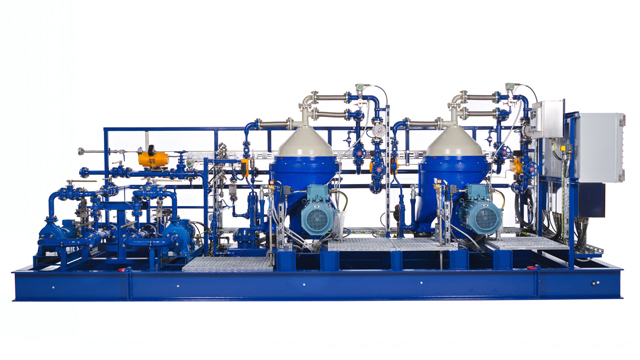Falcon
Alfa Laval FALCON treatment systems use centrifugal separation to remove any solids and water that might contaminate the fuel and lube oils used in a wide range of engine equipment.
The Alfa Laval FALCON system is designed to help protect the engine equipment used in the oil and gas industry by keeping fuel and lube oils clean. This ensures reliable performance, cuts down on service, maintenance and downtime, and extends the service life of key installations. These benefits make FALCON units popular for use on offshore oil and gas drilling rigs and production platforms, where reliable engine equipment can be mission critical and downtime particularly costly.
The FALCON separator units feature a compact, modular design centred around a disc stack centrifuge, one of Alfa Laval's main separator technologies. The basic equipment comprises the centrifuge module, an electric motor and built-in paring disc pumps for clean oil and dirty water. A range of other ancillary equipment is available to provide a complete installation for removing any solids and water that might contaminate the fuel and lube oils.
FALCON systems provide automatic, unattended operation, with the important advantage of being self-cleaning. No pre-filtration is needed, and with no filter cartridges disposal of any sludge removed from the fuel oil or lubricant can be done in an environmentally responsible manner.
Installing a FALCON unit between the bunker tank and the day tank helps protect diesel engines by removing any undesirable water and sludge particles from the fuel. The FALCON range also includes modular, self-cleaning units designed to deal with heavier types of fuel and crude oils. These installations include the requisite pre-heaters, starter units and control panels, with other equipment available as options.
Alfa Laval FALCON units are also extremely effective at ensuring that the lubricating oil for engines is clean. They remove virtually all the contaminants likely to be encountered in lube oil, including condensate, sludge and particles that stem from combustion or wear on moving parts, and any effects of cooling system leaks or salt water entering the crankcase.
Como funciona
A disc stack centrifuge uses extremely high centrifugal forces to separates solids and one or two liquid phases from each other in one single continuous process. When rotated in order to create such high forces, any denser solids present in the fuel or lube oil are forced outwards against the bowl wall, while the less dense liquid phases form concentric inner layers.
The use of special “disc stack” plates provides additional surface area for the solids to settle on, speeding up the separation process dramatically. Alfa Laval FALCON fuel centrifuges can be fine-tuned to deal with different fuel viscosities and separation temperatures by selecting an appropriate gravity disc.
The two different liquid phases meet at the interface position, which can be moved so that separation takes place with maximum efficiency.
FALCON units are also fitted with special disc inlets to reduce any shear effects in the inlet flow. They also operate with reduced liquid containment volumes in order to minimize the weight of the installation and to provide improved safety margins.

